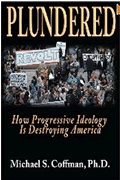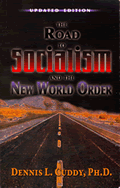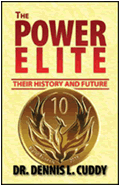AMERICA: FOUNDED ON JUDEO-CHRISTIAN OR ECONOMIC PRINCIPLES?
By
Dennis L. Cuddy, Ph.D.
September 16, 2013
NewsWithViews.com
"Now historians are discovering that the Bible, perhaps even more than the Constitution, is our founding document...." Your first reaction to the above quotation is that it probably was made by a fundamentalist preacher. However, it was actually an acknowledgment made by none other than NEWSWEEK (December 27, 1982).
Many say America was founded upon the Judeo-Christian principles of The Holy Bible, but others argue that economic principles were our foundation. In fact, both claims have merit. When economic considerations have been dominant, though, freedom was unfortunately denied to some and was interpreted as license by others.
Judeo-Christian principles were in evidence when our founders acknowledged in our Declaration of Independence that we are endowed by our Creator with certain unalienable rights, but then some individuals were not allowed to vote in certain elections or hold certain offices in the newly formed nation unless they met economic (property) qualifications. The desire for economic growth allowed the continuance of slavery, and as blacks continued to be deprived of their freedom, they turned to spiritual hymns for solace. Similarly, as the country expanded westward, missionaries brought the Gospel to the Indians, but the acquisitive desire of many whites led to the killing or removal of Indians from their land to obtain it or the minerals thereunder. Denied their freedom, surviving Indians were placed on reservations.
As the Industrial Revolution progressed, many Americans, especially immigrants, were forced to work for almost nothing. However, something called the "Social Gospel" arose, calling upon those financially advantaged not to exercise financial license under the guise of free enterprise, but to practice moral responsibility toward the downtrodden.
Some historians have claimed that we entered both World Wars due to economic interests, but individual American soldiers faced with the possibility of death on the battlefield increasingly turned to prayer, as did many other Americans during the hardships of the Great Depression between the wars. After the Second World War, church attendance by a thankful people rose. Yet it was also a time of new technological gadgets and modern conveniences which many Americans were eager to obtain. Having been deprived during the Great Depression, the youth of the 1930s were now parents and spoiled their children with material possessions. These children became the increasingly materialistic teenagers of the 1960s and young adults of the 1970s. Turning away from Judeo-Christian principles, they became the "Me" generation, "looking out for Number 1," instead of answering "yes" to the question in Genesis 4:9, "Am I my brother's keeper?"
The phrase "freedom of choice," which was used to evade school integration in the 1950s and 1960s, became the slogan in the 1970s of those supporting the right of women to kill preborn children through abortion. The "right to life" stressed in the Declaration of Independence had given way to personal or economic considerations.
During the 1980s, economic concerns remained important, but there was also a resurgence of religious influence in our nation, with fundamentalist Christians increasingly taking part in the political process. Unfortunately, in the 1990s, there was a resurgence of materialism and moral apathy, resulting in a growing acceptance of immoral behavior. Whether President Clinton committed adultery and perjury seemed to matter little to a majority of Americans.
Our capitalistic economic interests by themselves amount to nothing more than selfish greed, but when they are used to promote Judeo-Christian principles through charitable acts, they have helped many. When used in this manner, capitalism is better than socialism or any other economic system, as illustrated by the following example. A capitalist and socialist each had $5000 which they invested and doubled.
| Subscribe to the NewsWithViews Daily News Alerts! |
The socialist gave all of his profit to the poor, but the capitalist kept $1000 of his profit, giving only $4000 to the poor. At first glance, it appears that socialism is more helpful to the poor than is capitalism. However, if the above process were repeated 4 more times, for example, one would see that the socialist would have given $25,000 to the poor, but the capitalist would have given $30,000 to the poor while having $10,000 for himself (the second time, the capitalist would have invested his $6000, double that, given $5000 to the poor and kept $7000, reinvested his $7000, doubled that, etc.). Thus, while our country was founded both on Judeo-Christian and economic principles, it is only when economic principles serve our religious ideals that our nation can be truly great.
Remember that 1 Timothy 6:10 states, "The love of money is the root of all evil." Therefore, let us hope that in the future our nation will return to serving our best moral ideals, and once again be deemed worthy to be called truly great.
� 2013 Dennis Cuddy - All Rights Reserved














 Share
This Article
Share
This Article






